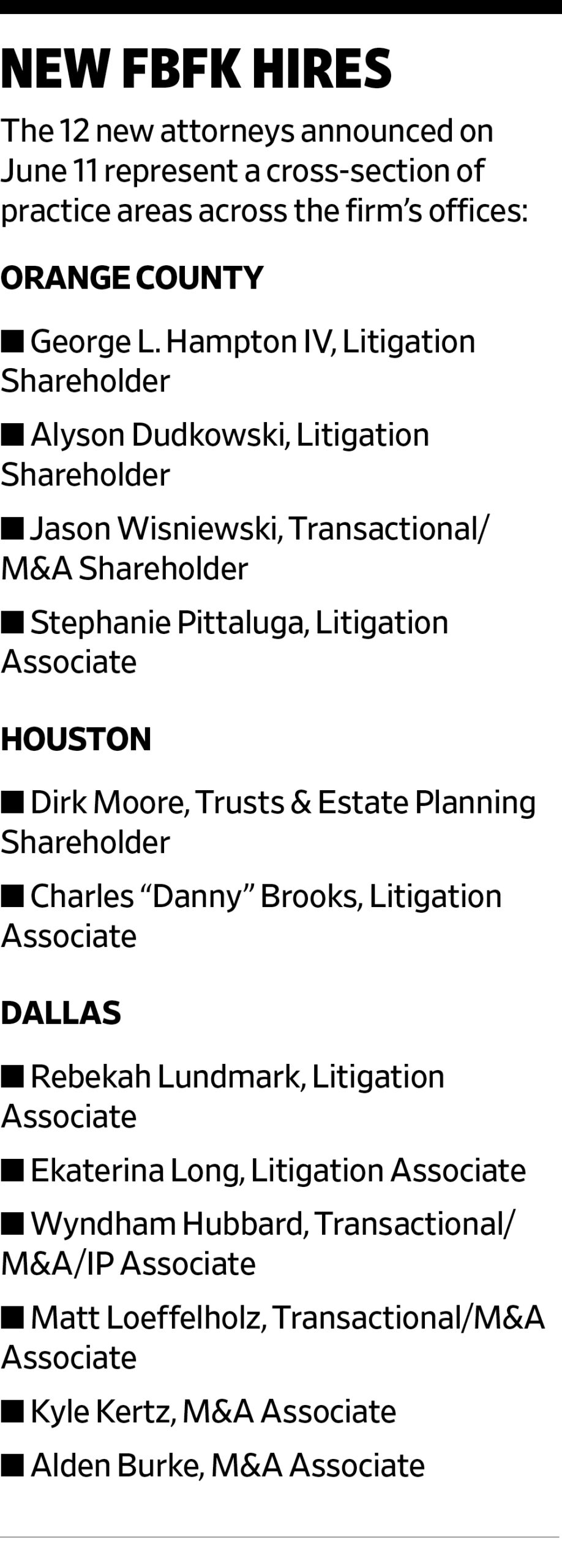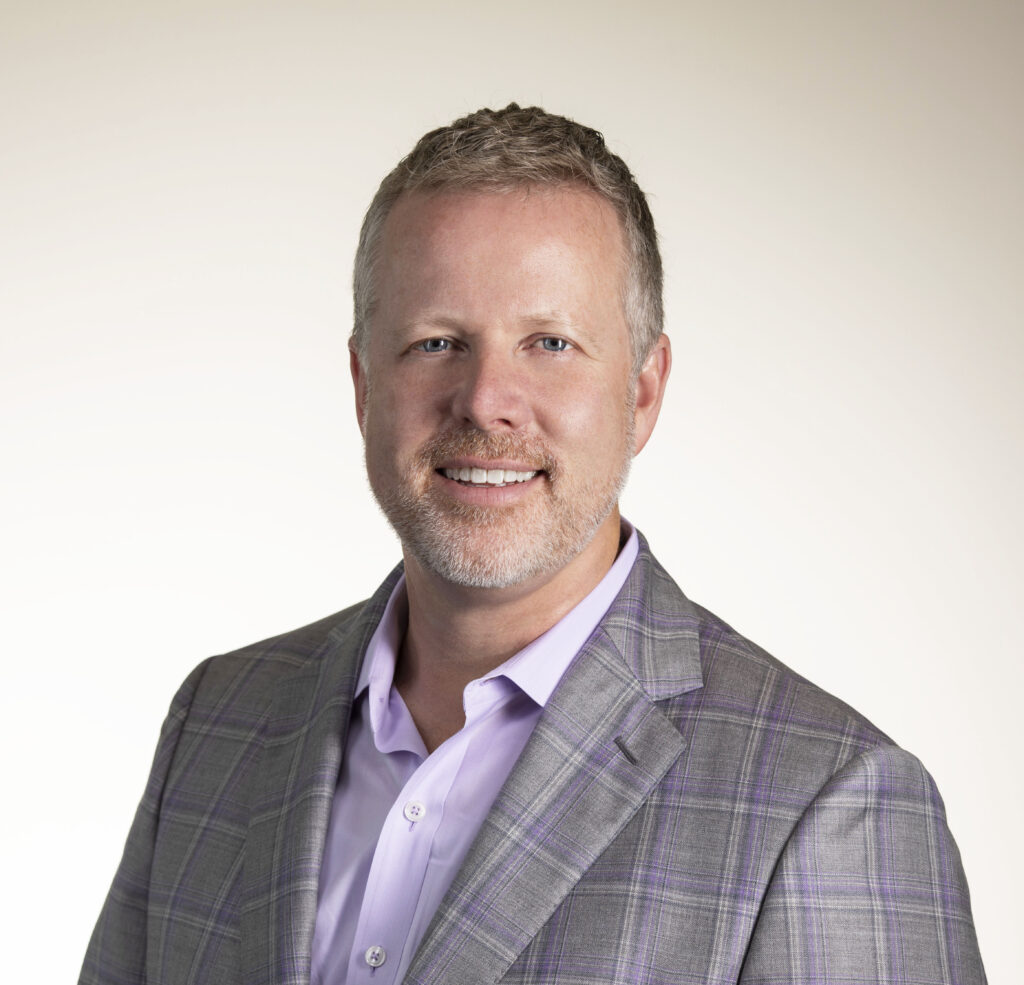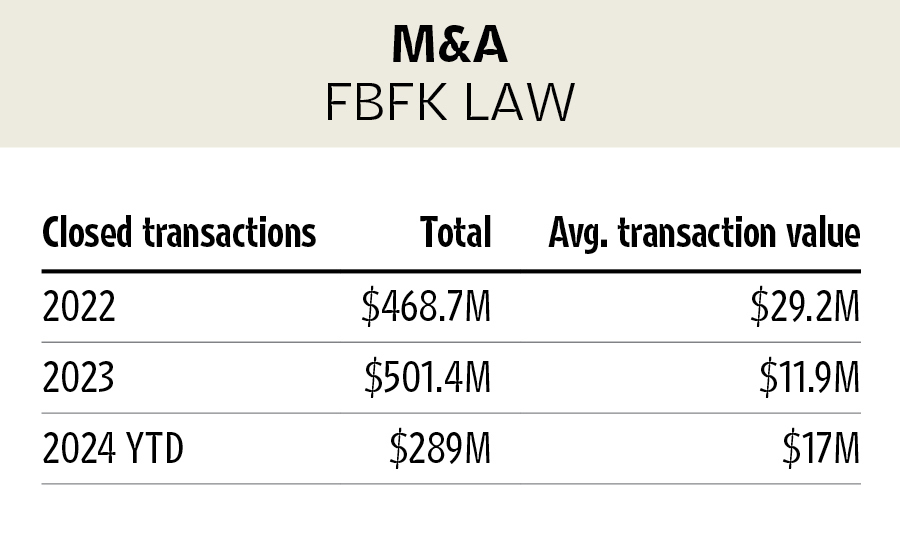Earlier this year, while the leaves were brown and the sky was gray in Texas, FBFK Law Firm announced that it was expanding again, this time outside the Lone Star State.
Why was CEO Kyle Ferguson California Dreamin’ on such a winter’s day? His boutique firm had just planted its flag in the Golden State via a combination with Orange County litigation firm Stephens Friedland, giving Plano-based FBFK a tactical outpost in a stout entrepreneurial market.
The merger was eight months in the making before being announced on January 8. A mutual friend introduced Ferguson to John Stephens, and the two firm leaders quickly realized the potential of combining forces.
Stephens’ firm wanted to add more service offerings, such as intellectual property and transactions, for its clients. FBFK had been looking for several years to establish a greater presence in Orange County to offer its clients greater reach, the firm told The Texas Lawbook at the time.
Six months after the merger was announced, the integration of the two firms has resulted in FBFK increasing its headcount by more than 30 percent since January 2023. On June 11, the firm announced the addition of 12 new attorneys, bringing its total to 58.

“The demand for top-notch, high-touch, reasonably priced, full-service law firms in the middle market is greater than we’ve ever seen,” said Ferguson. “The opportunity for growth is huge, and we’re grateful to be filling this critical, unmet need across three of our growth markets.”
Amidst the growth, The Lawbook recently caught up with Ferguson, who is racking up plenty of frequent flyer miles commuting between the firm’s offices, to talk about how the merger is going, how growth in the firm’s three dozen or so practice areas is shaping up and what the outlook is for the middle market — and what that means for more expansion.
The Texas Lawbook: You saw an opportunity in Orange County. What motivated FBFK to expand to California?
Kyle Ferguson: Orange County is a robust entrepreneurial market with an active middle market scene. There are a lot of very driven people there, similar to North Texas. It’s a beautiful market with a lot of really wonderful, driven, highly intelligent, entrepreneurial-minded people. California does get a bit of a bad rap from the entrepreneurial community, and rightly so from a regulatory perspective.
Obviously, it’s smaller than DFW. It’s a suburban market, generally relative to Los Angeles. There was a need for more middle market service providers, and in the pricing category where FBFK is, there’s just so much opportunity. Large firms continue to raise their average effective rates to well over $1,000, which makes it difficult for middle-market entrepreneurs who have businesses that generate $20 million to $200 million or so. They have a lot of needs. Their options are to go to a large law firm and pay those pretty significant hourly rates for everything they need, or they’ve got to act as their own general counsel and use multiple boutique law firms with areas of specific expertise. That’s quite a burden.
As an entrepreneur, you need to focus on scaling and building your business rather than managing a bunch of law firms. We’re not looking to compete with the big law firms. We’re looking to complement what they do.
We have good friends at those firms. We want to slot into the marketplace in an area that they don’t really want to focus on. It’s just different from what they’re efficient at doing.
As has happened across the country, these big firms have increased in Orange County and consumed more small boutique firms. This has left a bit of a vacuum in the marketplace and created opportunity. There aren’t enough capable, full-service law firms at a price point that most middle-market business owners are comfortable paying.
Typically, we’re trying to set our average effective rate at $600 to $650 an hour. That’s what rates were the big firms a dozen years ago.
The Lawbook: How are you able to provide a full-service platform for these companies with a myriad of needs?
Ferguson: That gets to the other side of the equation for me. As I’ve gotten older, I’ve become more passionate about the lawyers themselves.
I spent the first 20 years of my career avoiding lawyers and just doing my own thing. In the early part of my legal career, I noticed that most lawyers did not enjoy practicing law.
I remember we had at the Texas Bar a seminar talking about drug abuse. It’s a risk in the legal profession and they give you training and resources to deal with that. I was blindsided. “Oh my gosh, what am I getting into here with this profession, with these people,” I wondered.

Kyle Ferguson, CEO, FBFK Law
But if you think about it, you have a lot of really smart young people who get into law school, but they need to learn what practicing law is about. They get thrown into this profession where, suddenly, they’re selling their time. And the more time they sell, the more money they make. Talk about a recipe for just psychological torture!
I found a lot of these lawyers that I worked with as a young lawyer; they weren’t really happy. And how can you blame them? It’s a tough profession, especially now and it’s only gotten worse. Now, the big firms are shooting for billions of dollars in annual revenue, which was almost unheard of 20 years ago. And there are two ways to hit those figures each year: raise rates and sell more time. The only way you can sell more time is by adding more lawyers and getting the current lawyers to bill more time.
These big firms are charging baby lawyers right out of law school at $700 bucks an hour and they’re told they have to bill between 2,000 and 2,400 hours a year to be eligible for a bonus, so they are scrambling. Some people are going to love it, but I think that’s pure misery. Many people are not going to love that, and they want to be in a different environment. Or lawyers who are very entrepreneurial and prefer going out and helping people, managing the clients and working with the business owners face-to-face on a consistent basis. It’s more rewarding and fulfilling than just resolving a legal issue.
At a big firm, the lawyers who do that go out and land a middle market business as a client, possibly someone you have known for years, and they trust you and want you to represent their interests. Well, if you’re an attorney with two decades of experience, your rates are going to be $1,500 an hour. Your buddy who runs that middle market business can’t afford to hire you anymore, which leads to you losing your clients.
An entrepreneurial client doesn’t want to have five attorneys on every call and for every situation or deal they’re doing. They want to avoid paying an average effective rate of $1,200 or $1,300 an hour. They want efficiency. And you want your lawyer to think that way as well.
I want FBFK to be a refuge for lawyers stuck in that loop. We’re not in competition with big firms; we’re a complement to them.
The Lawbook: How can you implement that as a consistent strategy?
Ferguson: A big firm doesn’t really care about a lawyer’s middle market client that pays them $1 million a year. They have clients paying them $10 million, $20 million or $30 million a year or more. So, your client that’s paying $1 million is just a distraction, especially as the client is complaining about the bills, and every billing cycle, they’re asking for discounts. It’s a pain.
In some instances, the big firm’s management team looks at it as a client that is consuming endless resources. And they’re right: it’s not efficient. The big firm then discounts the hourly rate 15% to 25% for that client, and they’re unhappy all the time, and it’s still not enough for the client.
Meanwhile, they have another larger client that never complains about a bill. They pay within 24 hours of being invoiced and pay full rates. So why wouldn’t a big firm want to focus on that work instead?
FBFK will do that work that a big firm doesn’t even want to do. They can keep doing the work for the big clients, whether it’s a company, private equity fund or a large family office. They can keep doing their $1 billion deals. We’ll do all their $20 million to $300 million deals cost-effectively. We won’t poach your business at all. They stay in their preferred lane, and we’ll stay in ours.

Additionally, we’re an attractive option for lawyers who really enjoy managing their own book of business and relish directly working with the clients. You can build the rate that they want that they want to pay. We don’t tell our young lawyers to bill 2,000 hours. We’re telling them, “Hey, bill 1,600 or 1,700 hours. That’s a nice living. I am a fan of work-life balance, and I want our young lawyers who have young families. I want them home in the evenings and on weekends. That’s not to say that we won’t grind when there’s a deal to do or a deadline to meet, but as a matter of practice, I don’t want my young lawyers to bill 2,000 hours routinely.
The Lawbook: What cultural differences or opportunities have you noticed between Texas and Orange County?
Ferguson: It’s crazy how much alike they are. I was shocked at how welcoming and kind the business community has been to us and me personally. The middle market community is strikingly similar to the one in Texas. The service provider community is comparable. There may be a little less competitive vibe here, but maybe that’s because Orange County is a little bit more of a smaller market. It’s a smaller business community for the service provider community, but it’s got all the big law firms as well.
The Lawbook: What were some of the challenges that you faced and overcame during the integration process with Orange County?
Ferguson: We’re dealing with some of that even as we speak. You know, California has a strict regulatory environment. I won’t wade too much into that, but we have to do a bit of restructuring ourselves to make sure we’re compliant with the state’s rules and regulations for law firms. We just hired a new HR manager for the firm, and she’s going to be based in our Orange County office because California has more stringent labor and employment laws than Texas.
The Lawbook: What are some of the new practice areas you’re planning on exploring as a result of the firm’s recent growth?
Ferguson: Our data privacy practice is one. Steve Toland, who is in our Austin office, is in charge of that. White-collar criminal defense is another, also led by our Austin office. Land use is another. Health care and medical technology are two others, as those are huge segments in Houston and California. I would love to add some more resources, both on the transactional side and the intellectual property side, to serve those segments.
The Lawbook: How is activity in the middle market and family business space right now? Are you seeing more deals and more exits? If so, what do they look like?
Ferguson: The middle market segment is going to continue to be hot. It has been on fire. We have had three to four closings a month. It’s been that active, and it’s been that way for several years now. We even had that happen through Covid.
It’s just been consistently busy. Hence, we needed to hire four new transactional lawyers in the last 60 days to accommodate that growth. I don’t have enough sociological expertise to estimate the size of the Baby Boomer population, but that was the most entrepreneurial generation in history. Now, they are retiring, but they have these great, healthy businesses.
Generally speaking, it should not slow down for the next five years. That doesn’t mean we won’t have a blip in the economy. Even so, people are just getting a little more creative with how they’re doing the debt financing piece and structuring the financing of deals, but they are still so active.
Obviously, as the leader of a law firm that serves that segment, I’m bullish on it. I wouldn’t be adding lawyers to our team if I weren’t; but it’s active in Orange County and Texas. For the next 12 months through the end of next year, it’s going to be a very active transactional market. We’re well-positioned to capitalize on that. The firm’s growth is due to our need to speed up our responsiveness to the needs in the marketplace.
The Lawbook: What are your short-term goals that are going to set the firm up for success in the next few years that you can reasonably accomplish before the end of this year?
I would love for us to have 65 attorneys by the end of this year and 80 lawyers by the end of next year. I would also love for our transactional practice in Orange County to be supplemented a little bit more.
We have a lot of demand for our litigation practice in Orange County and need more good litigators there, so we need to beef up the litigation team and add another couple of lawyers, if not three or four, by the end of the year.
In Texas, I really want to focus on ramping up our transactional presence in Houston and Austin. But I feel like we’ve got untapped potential in the Houston market that we haven’t fully tapped into.
